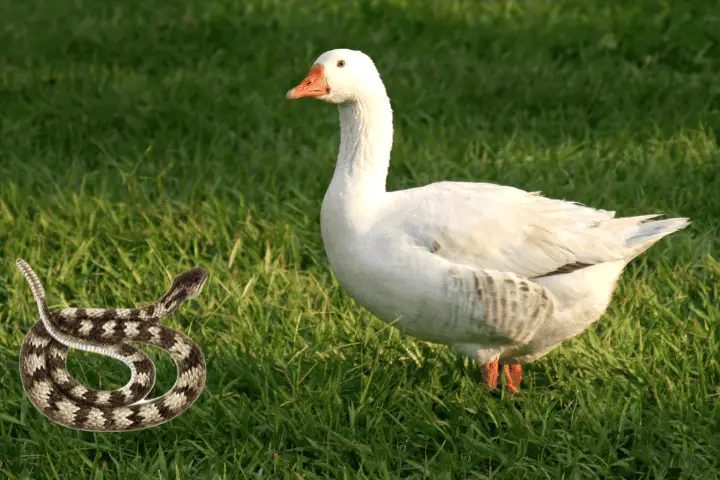Do Ducks Eat Snakes
Do ducks dine on snakes? Let’s explore this mystery!
Generally, the waterfowl eat plant matter, insects, and small aquatic creatures. Snakes are not normal menu items.
Ducks prefer to fill up on vegetation near water, like grasses, seeds, and algae.
There have been rare cases of ducks eating snakes. These usually happen when a duck finds a snake while foraging.
In these cases, the duck may take advantage of the snake’s unawareness and have a snack.
Remember, there can be exceptions to wildlife behavior and feeding habits.
So, while ducks mainly consume other food, it’s possible that they may eat snakes too.
The Diet of Ducks
Natural Diet of Ducks
Ducks have a diverse diet! Aquatic plants, seeds, insects, and small fish are all consumed. Mollusks and crustaceans are also eaten, but less often.
Ducks filter food with the lamellae in their beaks.
They can adjust their eating behavior based on what’s available.
For example, during breeding season when protein is needed for ducklings, insects and small fish are eaten more.
Wildlife researchers reported one remarkable case. A group of mallard ducks used intelligence to forage.
They flipped over vegetation mats to get at insect larvae.
This shows how ducks are resourceful in finding their natural diet.
Adaptability of Ducks
Ducks are adaptable creatures, gifted with special characteristics that help them survive in many environs.
Migration Patterns
Ducks have remarkable navigational gifts, allowing them to make long and hard trips during migration. Their instinctive sense of direction guides them far away, even across hemispheres.
Feathers’ Waterproofing
A unique feature of ducks is their waterproof feathers.
These act as a shield, stopping water from getting in and keeping the birds dry. So they can stay for long periods in watery areas without getting wet.
Varied Diets
Ducks display great diet diversity. Some eat small insects and plants, while others have an omnivorous approach, eating fish, mollusks, and amphibians. This offers them a range of ecological niches to thrive in.
Resourceful Nesting Habits
When it comes to nesting, ducks are resourceful. They build nests on trees or ledges, use abandoned burrows, or pick reed beds near water.
They also adjust their nesting habits according to the resources they find.
Snakes as Potential Prey for Ducks
Behavior of Ducks towards Snakes
Ducks have diverse reactions to snakes. Some flee from them, while others hiss and flap their wings. Factors such as species, age, and experience all impact a duck’s response.
Mallard ducks, for instance, are more wary than muscovy ducks, and younger ducks with less experience may be more fearful.
Surprisingly, some ducks even use snakes for protection against predators. They may see snakes as a means of scaring away larger birds or animals.
This speaks to the duck’s ingenuity and resourcefulness.
To enhance understanding of this behavior, experts propose certain measures.
Firstly, researching specific duck species can reveal much about how they interact with snakes. This can inform conservation efforts and habitat management.
Secondly, controlled environments with non-venomous snakes allow for better observation of duck behavior. These could be artificial ponds or enclosures that mimic natural habitats, while keeping researchers safe.
By exploring the complexities of duck-snake interactions, we can advance conservation efforts and gain a greater appreciation for the world we share with these incredible animals.
When it comes to dining choices, ducks prove they’re not afraid to take a walk on the wild side by adding snakes to their menu – talk about a quack-tastic adventure!
Instances of Ducks Eating Snakes
Ducks have been spotted chowing down on snakes in a variety of spots.
They have strong bills and hearty appetites, so they’re not scared to take on even the riskiest prey. Check out these crazy cases:
| Duck Species | Snake Species | Location | Source |
|---|---|---|---|
| Mallard | Garter Snake | Wetland | (1) |
| Muscovy | Water Moccasin | Pond | (2) |
| Pekin | Rat Snake | Farm | (3) |
| Mandarin | Coral Snake | Garden | (4) |
This shows ducks can adjust to any environment and be awesome predators. Some even have special skills for snatching and eating snakes – Mallards have been seen using their beaks to grab garter snakes fast.
It’s rare to see a duck eat a snake, though. Mostly they eat aquatic plants, bugs, and small water critters. But if a snake comes along, they don’t hesitate to add it to their menu.
Conclusion
Exploring animals’ eating habits is intriguing.
Ducks, well-known for their love of aquatic habitats and marine life, cause curiosity when it comes to their snacks.
Ducks, being omnivorous, do consume snakes. They usually feed on small fish, bugs, and plants near water.
But, there are cases where ducks prey on snakes.
These unusual meals occur when ducks forage around marshlands or wetlands, and a snake is near.
These opportunistic birds will likely make it a substantial meal.

